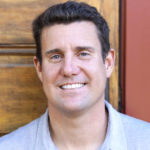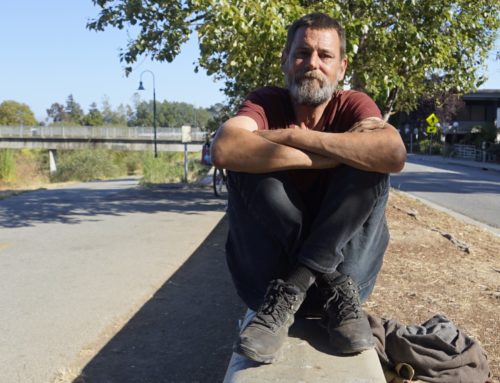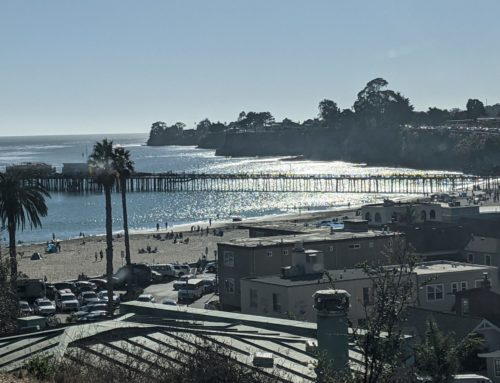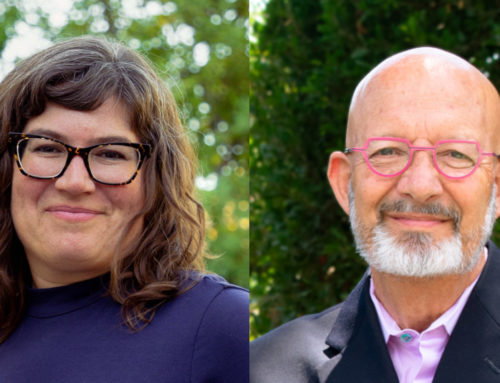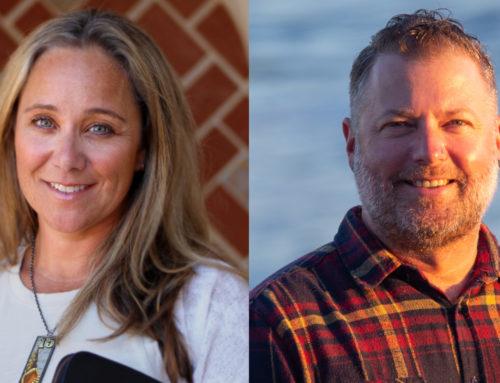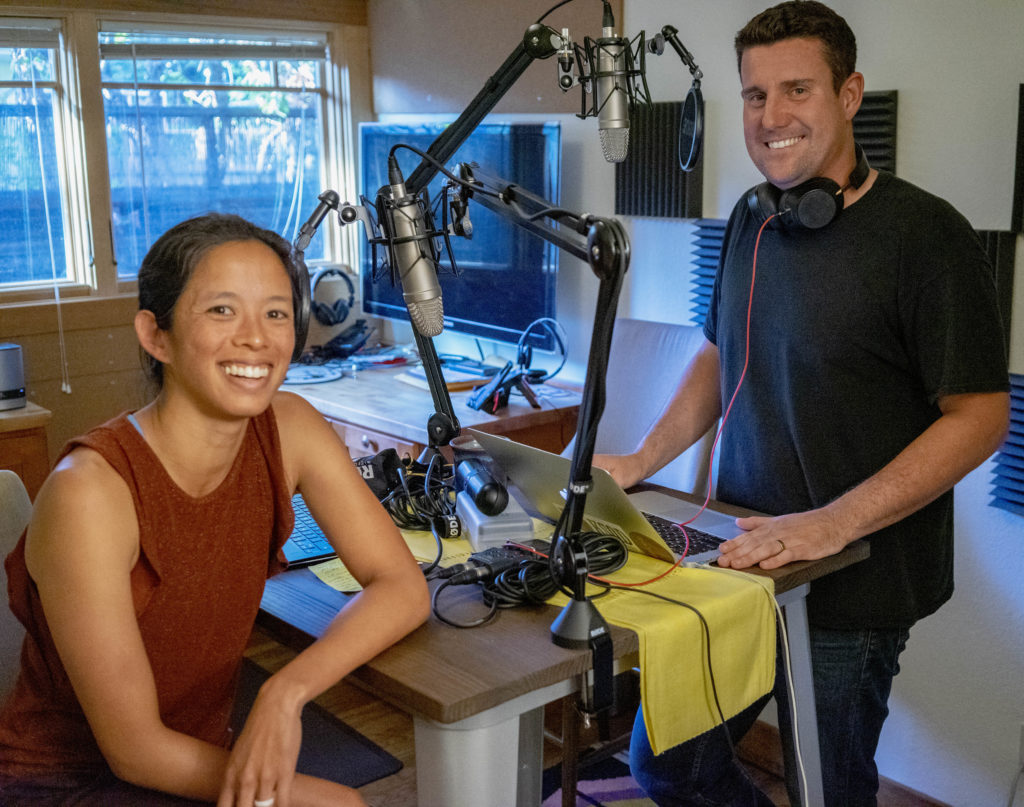
Who are we and why are we making a podcast on Santa Cruz’s public institutions? How are we funded? What is the state of local media in Santa Cruz?
Co-hosts Kara Meyberg Guzman and Stephen Baxter talk about their motives behind creating Santa Cruz Local. We share the results of our listener survey on what local news you’d like to see more of. And we meet one Santa Cruz Local listener and hear her constructive criticism.
This is part one of a miniseries on our relationship with you, our listeners. Sign up for our newsletter to participate in our new survey and learn how you can join our growing community of civically-engaged Santa Cruz locals.
TRANSCRIPT
Kara Meyberg Guzman: This episode is sponsored by Santa Cruz Works. Santa Cruz Works is a local nonprofit building a healthy tech ecosystem. Grow your business, find funding and learn about jobs, news, technologies and events at santacruzworks.org. Santa Cruz Local listeners get a 10 percent discount on Santa Cruz Works memberships. Just use the discount code SANTACRUZLOCAL – that’s all one word, all caps.
[MUSIC]
KARA MEYBERG GUZMAN: Hey everyone. I’m Kara Meyberg Guzman.
STEPHEN BAXTER: And I’m Stephen Baxter
KMG: We’re the co-hosts of Santa Cruz Local, which is a podcast and website that reports on Santa Cruz’s public institutions. But today, we’re trying something completely different.
SB: We’re former print journalists building a local news startup in Santa Cruz.
KMG: And it’s exciting. And we want to take you along for the ride. So, for the next eight weeks, as we approach our official launch, we’re going to take you behind the scenes.
SB: We’ll still give you news stories every week. This miniseries will be a companion to our regular episodes.
KMG: We want to earn your trust. And to do that, we think you should get to know us. And vice versa.
SB: We’re calling it “Meet Santa Cruz Local.”
Because, we think you should know where your news comes from.
Since we started posting news podcasts in February, we’ve attracted hundreds of listeners like you. About 450 of you get our weekly newsletter.
Some of you have also emailed us and asked some interesting questions about who we are.
KMG: Here’s an email we got from a Santa Cruz Local listener from March.
I feel like I can’t get the whole story from you without knowing who you are, how you’re funded, and why you’re podcasting. Be more transparent about where you’re coming from and the provenance of your output.
OK, I like that. Let’s get to it. Stephen, I’ve got some questions for you.
SB: Fire away.
KMG: I know about your background in journalism but I don’t think our listeners do. Tell me a little bit about your road to Santa Cruz Local.
SB: Well, I’ve got a master’s degree in journalism from Northwestern University. I was a crime reporter at the Sentinel for about six years. And I worked for a bunch of newspapers, mostly daily, all over the country before that. And I’ve won five awards from the California Newspaper Publishers Association.
KMG: I think listeners would be interested to hear about your time at the Sentinel. Tell me about some of your interesting stories from that time.
SB: Well, a lot of it was covering breaking news, police and fire, and courts. So a lot of it was a little bit reacting to big stories at the time. Like murder trials. Like natural disasters.
But a lot of it, too, was investigative stuff, basically, that we had to work at and chip away over time. One thing that comes to mind is, you may remember, there were two police officers killed in Santa Cruz, Det. Butler and Baker. And they had a memorial fund set up for them, which a lot of people contributed to. And none of the money had been spent at all a few years later because of lawsuits and family issues. And that story broke that whole thing open.
Another story that comes to mind was about the needle exchange that had gone awry from the county-run group to a group that was basically dealing with syringes out of a dark laundromat in Lower Ocean for a while. And eventually that got reined in by the county, I think because of some of the stories about it.
KMG: What year was that again?
SB: That was in 2013. Other than it’s some maybe murder trials that you might have heard of, like the Alix Tichelman case, the “Harbor Hooker,” you may remember. Even national news was into that because a Google executive had died with a lethal dose of heroin given to him by a call girl. So that case was in court for a long time.
Lots of gritty criminal stuff.
KMG: Well, I know this about you, that you were really burned out by 2016. Covering crime is a really tough, unrelenting job. It’s almost a 24/7 thing. You have to be on call all the time. And so, you took a break from journalism in 2016. Tell us a little bit about that.
SB: I did, yeah. My wife had a baby around that time and I wanted to be there for that. And I wanted to not work crazy hours and all that. So that was part of it. So I started to work for my friend’s company doing home appraisals, and I got licensed actually, this year too. So that’s my day job. And I do this news podcast thing on the side.
KMG: OK. Last question. Tell our listeners why you are back in journalism now.
SB: Oh, because I think that there’s a lot of need for it in the town. And because I like to do it, and because I think that there’s a lot of stories out there that haven’t been told. And I think maybe could be told better through this medium. Especially getting to listen to people’s voices and hearing their stories.
And also hopefully exposing some big stories that have maybe been missed by our local media lately.
Now, quick fire questions to you, Kara.
KMG: OK.
SB: So where did you go to school? What’s your background in journalism?
KMG: Well, I went to Stanford. I graduated in 2005 with a biology degree. I thought I was going to go to med school but instead ended up teaching tennis to low-income kids for a couple years. Then in 2013, I took an unpaid internship at the Santa Cruz Sentinel.
I worked my way up. And from 2017-2018, I had the top editor position. I was the managing editor. I was not only the first woman, but also the first person of color to lead the Sentinel’s newsroom in its 161-year history.
SB: And what are you proud of in the journalism you’ve done?
KMG: Actually, during my time at the Sentinel, I was really proud of our coverage of the Bear Fire in October 2017. It burned 400 acres in the Santa Cruz Mountains. And we were the first news organization to have a story about the origins of the fire.
I’m also proud of the editorial board that I resurrected. It was an immense amount of work. I recruited five community members to join the editorial board and serve as advisory members. And I thought it was really important so that we could weigh in on the 2018 elections.
SB: OK, one last question. Why are you continuing on with local news?
KMG: Yeah. Like you, I felt like there was this huge need. You know, being at the head of the local paper from 2017 to 2018 I really saw the holes in our local media landscape. And I just feel a duty. I feel like the community needs another news organization. There needs to be more coverage.
And also, I love the work. It’s just really rewarding and really fun.
So enough about us, let’s talk about how we’re funded.
The short answer is, we’re still bootstrapping right now, so that means a lot of it’s coming from my savings.
And both of us are working for free.
But also, we’ve received about $1,000 in contributions from listeners, that we’re really grateful for. And we also have one sponsor so far, Santa Cruz Works. But we’re also talking to more.
But I feel like everything really starts on Aug. 19. That’s when our membership drive starts.
I think what the listener wants to know though, is our long term funding plan. So to do that I think you need to understand the problem. So take a step back for a second.
Ad revenue for newspapers isn’t what it used to be, because of Google and Facebook. Classified ad revenue isn’t what it used to be, because of Craigslist.
And also, here in Santa Cruz, there’s a hedge fund that owns your local newspapers and others across the country. And it’s stripping them for parts.
So, yeah. And I think we have the solution for that. You know, local newspapers are dying because they rely almost solely on print ad revenue, and to a smaller degree, subscriptions.
But what we want to do is diversify our revenue streams. So that means memberships, advertisements, sponsorships, events, merchandise. I mean, I think we have to get creative, but with ethical guidelines.
SB: OK enough about us. Let’s talk about you. We put a survey on our website from February to July and 188 people responded.
It was just an informal survey; it’s not scientific. But it did give us some insight about how you read, listen or watch local news.
KMG: First question: How many of you read, listen or watch local news at least once a day?
SB: Survey says: About 90 percent of you consume local news at least once a day.
KMG: Second question: Where do you get your local news besides Santa Cruz Local?
SB: Three-quarters of you say you get your news from the Sentinel. Three quarters of you also say you get your news from the social media site Nextdoor. And half of you also say you get your news also by word of mouth
KMG: What kind of local news do our listeners want more of?
SB: An overwhelming number of you, 85 percent, said news about city government and deeply-reported investigative pieces are what you want. That was followed by news about housing and development, which was 70 percent. And then breaking news about police and fire, about 55 percent.
KMG: Stephen, what was most surprising to you from the survey?
SB: Well one part that was interesting was that 90 percent of our listeners are 41 or older. And then most of that group is 51-64 years old. And then about 30 percent of you are 65 and older.
[MUSIC]
MAURA KELSEA: I think reaching the younger generation is absolutely crucial.
KMG: That’s Maura Kelsea. She’s a retired nurse. I spoke to her last week at her cottage in Seabright.
She was one of Santa Cruz Local’s early supporters. She gave us $25. And she’s sent me some nice messages about Santa Cruz Local on Nextdoor. So I wanted to ask her for some constructive criticism on our work.
She said she hoped we’d draw a younger audience.
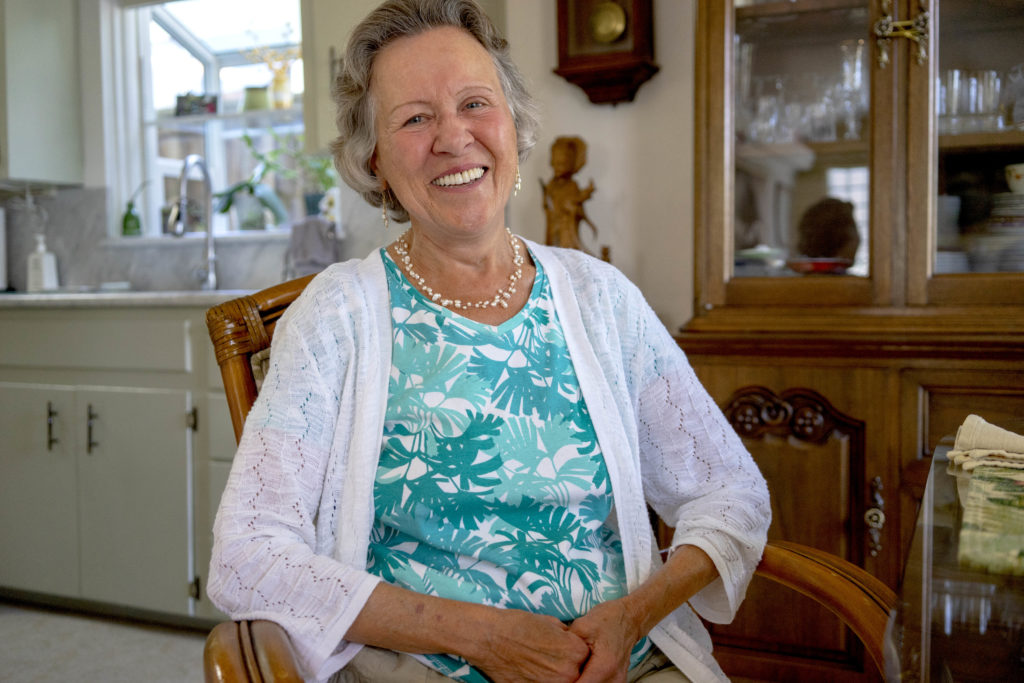
KELSEA: I think that if you had any major goal that would be it. And I don’t know what’s taught in schools now but the impression I have is there’s a lack of civic education. Civics. What it means to live in a democracy, for example. I hate to use that word these days. And what it means to be involved in what’s happening in your neighborhood, in your town. So I think that is one side effect of what you can do, by example. I mean, you’re modeling it.
KMG: If you had to say that we had one bias or another, what would you say?
KELSEA: Well, I would say, that you’re looking, as it has to be, that you’re looking at what’s happening city-wide from the younger generation. Not from my generation.
I don’t feel that as an exclusion, or a barrier. But I would say that, for example, I would guess that you might have a personal interest in affordable housing. That could then lead to a bias of wanting to support more building, or more density, or bonus densities for example.
That would be my guess. Yes, so that would be sort of a bias.
KMG: Yeah, thank you. Um. I’m trying to do my best to not take any sides. Like, I really feel above all my duty is to present fair and accurate unbiased facts. But yeah, I mean there is, bias does creep in by choosing, by the decision of what you choose to cover I guess. But you know, we do take a lot of thought, in like, choosing our stories. You know, what is it that the public really needs to know?
KELSEA: Mm-hmm. I like that. You frequently use that phrase “and you need to know,” da da da.
KMG: Yeah.
[MUSIC]
KMG: Thanks to Maura for the honest feedback. We want to hear your feedback too. We have a new survey. If you want to participate, sign up for our newsletter at santacruzlocal.org.
Also, if you want to meet me in person, I’m going to be at this podcast meetup 10 a.m. Saturday July 27 — that’s this Saturday — at Abbott Square. I’ll be talking about Santa Cruz Local and our solution for local news. It’s free. Details are on our website, santacruzlocal.org.
That’s it for this episode. Thanks to our sponsor Santa Cruz Works. I’m Kara Meyberg Guzman. Thanks for listening to Santa Cruz Local.
SURVEY
Kara Meyberg Guzman is the CEO and co-founder of Santa Cruz Local. Prior to Santa Cruz Local, she served as the Santa Cruz Sentinel’s managing editor. She has a biology degree from Stanford University and lives in Santa Cruz.
Stephen Baxter is a co-founder and editor of Santa Cruz Local. He covers Santa Cruz County government.


